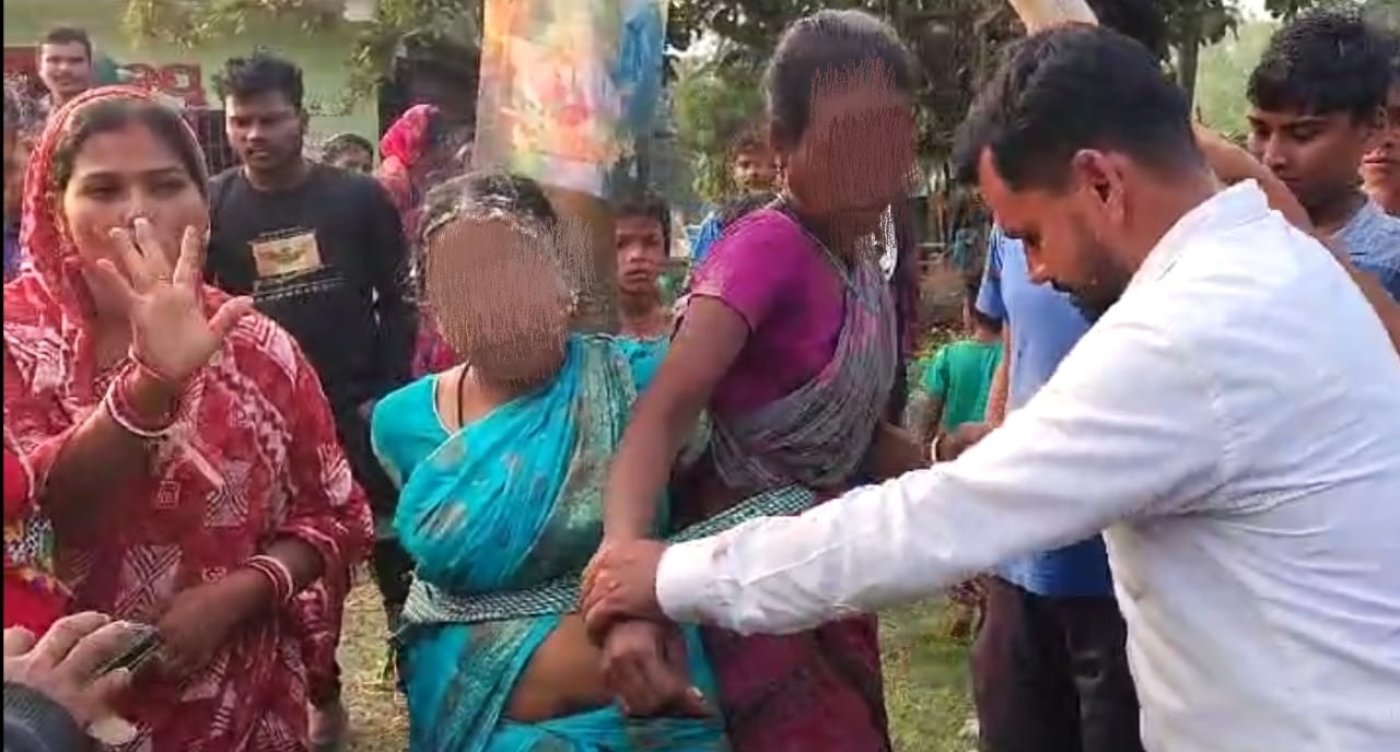Bhubaneshwar, Odisha: Budai Harijan’s voice faltered, as she recounted how she was forced to abandon Christian rites for her husband’s funeral. “They converted his body to Hinduism,” Budai told Article 14, recounting how a mob of 30-40 people performed a “shuddhi” (purification) ritual.
Madhu Harijan, 27, a Christian from Menjar village in south Odisha’s Nabarangpur district, died on 22 October 2024 at the district government hospital. When the corpse was brought back to Menjar, a village with eight Dalit and tribal Christian families amid a predominantly Hindu and non-Christian tribal population of about 2,000 people, non-Christian residents opposed his burial in the common graveyard.
According to Budai, they asked for the body to be “converted to Hinduism” as a precondition for burial.
Arun Suna, the Christian priest in the village, said when they complained to authorities, the Umerkote tehsildar said a burial could be arranged in a Christian-majority village instead.
The impasse lasted two days. As the body began to decompose, the family's resolve broke and they yielded to the will of the Hindu villagers, they said.
“The coffin was cast aside,” said Suna. “Madhu’s body, wrapped in a mat and lashed to bamboo poles, was carried away from home without a prayer.”
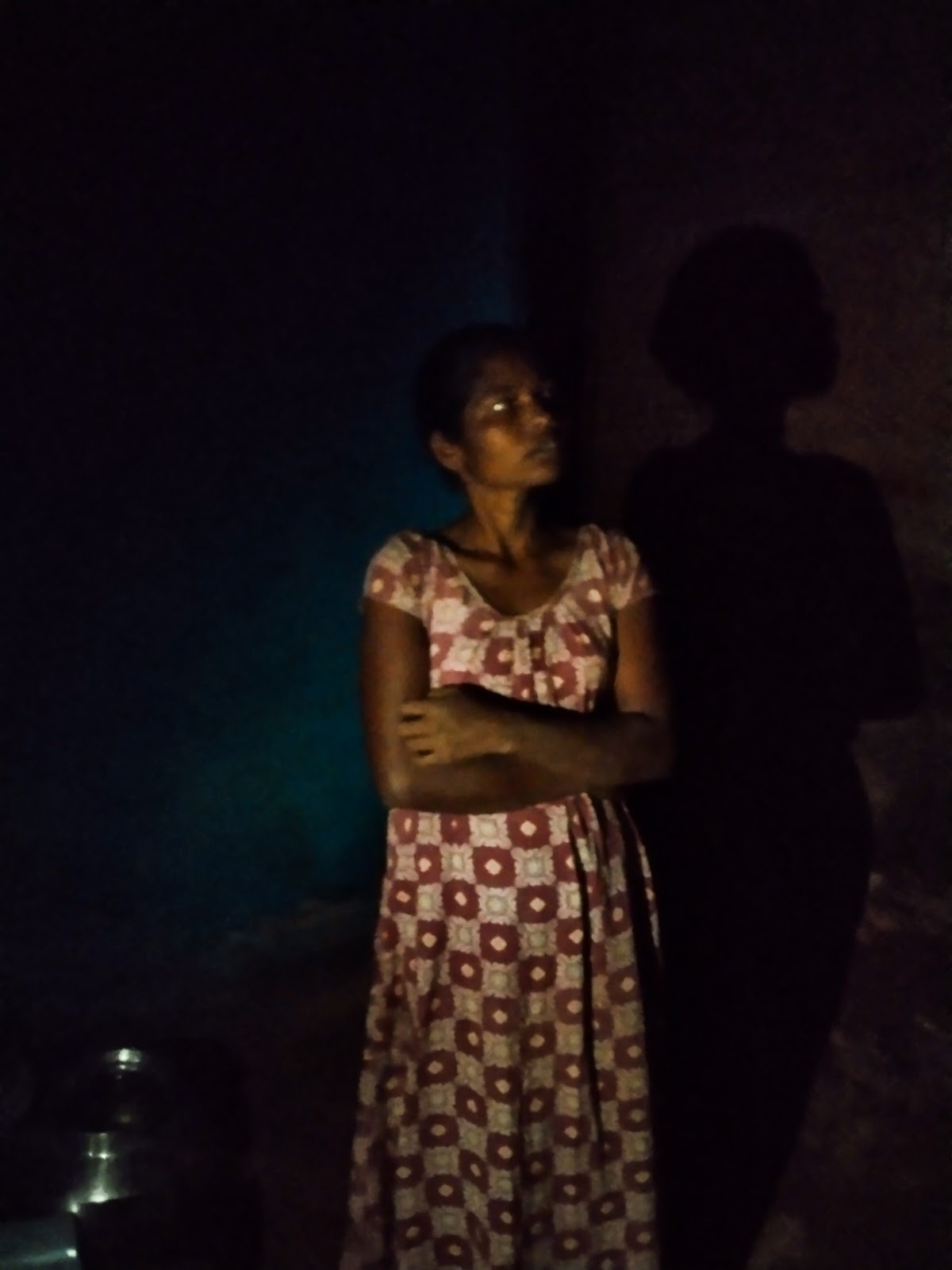
His remains were “converted” to Hinduism, and interred in a common burial ground following Hindu rituals.
Rising Violence Against Tribal Christians
A growing trend of violence against and intimidation of Christians in Adivasi-dominated regions in the country has left tens of thousands of tribal converts to Christianity faced with a choice between faith and peace.
On 2 November, the Chhattisgarh high court ruled that hoardings and banners in eight villages barring the entry of pastors and converted Christians were not unconstitutional, holding that these were installed to prevent “forcible conversion by way of allurement or fraudulent means”. The petitioners had contended that this amounted to segregation of Christians and their religious leaders from the village community.
In Odisha, which houses India’s third largest tribal population, nearly 70% of its 1.16 million Christians belong to Adivasi communities, as per the 2011 Census. These Adivasis practising Christianity have witnessed a sharp rise in violent attacks and incidents of excommunication in recent years.
In 2023, the United Christian Forum (UCF), a New Delhi–based group that monitors hate crimes, recorded seven incidents of anti-Christian violence in the state. Their records showed that cases doubled to 14 in 2024. In the first six months of 2025, the UCF documented eight such cases in Odisha, out of a total of 378 incidents reported nationwide in the same period.
A C Michael, national convener of the UCF, said there were an average of two incidents a day in 2025 across the country. He said the forum maintains records of cases reported to it by victims on its toll-free nationwide helpline.
Although no official data exists on the incidence of hate crimes against Christians in Odisha, at least one more Christian organisation recorded similar numbers. According to the Evangelical Foundation of India's annual report released in August 2025, there were 334 such incidents nationwide in the first seven months of 2025, including 10 incidents in Odisha.
In 2023, the organisation recorded five such incidents in the state, of a total of 601 cases nationwide.
Pallab Lima, Odisha state general secretary of the Christian non-profit organisation Rashtriya Christian Morcha and general secretary of the Biju Janata Dal’s (BJD’s) state minority cell, attributed the surge in anti-Christian incidents in the state to the Bharatiya Janata Party (BJP), which assumed power in the state in 2024, following the rupture of its alliance with the BJD in 2009.
Similar incidents during the BJD’s rule were “not as intense”, he claimed.
In response, Sameer Oraon, former Rajya Sabha MP and national president of the BJP’s Scheduled Tribes (ST) Morcha, said attacks on Christian places of worship occurred even before the BJP came to power in the state. “The BJP has imbibed ‘panch nishtha’ (five commitments),” Oraon told Article 14. “It follows ‘sarva dharma samabhava’—all religions are to be respected.”
The intimidation of and attacks against Odisha’s tribal Christians are consistent with a wider pattern. From 2014 to 2024, India saw 4,316 incidents of violence against Christians, peaking at 834 in 2024, concentrated in the Hindi-speaking and central-eastern tribal states, and in select southern pockets, according to the numbers recorded by UCF.
Data shared on 4 November 2025 by the National Christian Convention , a pan-India convening of various Christian groups, pegged the total number of incidents against Christian individuals, families and institutions in the country between 2014 and 2025 at 4,959. Violent incidents rose from 139 in 2014 to 834 in 2024, a 500% surge, according to this compilation.
Vulnerable communities were disproportionately impacted, the report said, including Dalit Christians, women and tribal Christians. Between 2016 and 2020, at least 21 Christians lost their lives in such incidents, including a pastor intentionally electrocuted in Rajasthan.
Deeping Majoritarian Politics
The intimidation of Adivasi Christians trying to bury their dead occurs against this backdrop, of demands to renounce their faith or face an escalation of religious hostility rooted in Odisha’s deepening majoritarian politics.
The incidents—ranging from posthumous ‘conversions’ to exhumations and forced burials in forests—are symptomatic of how local Hindutva groups, emboldened by the BJP’s rise to power in 2024, have extended the logic of ‘ghar wapsi’ to the dead.
With no designated burial sites for Christians in most villages, social boycott and a denial of dignity in death have become routine incidents in the state.
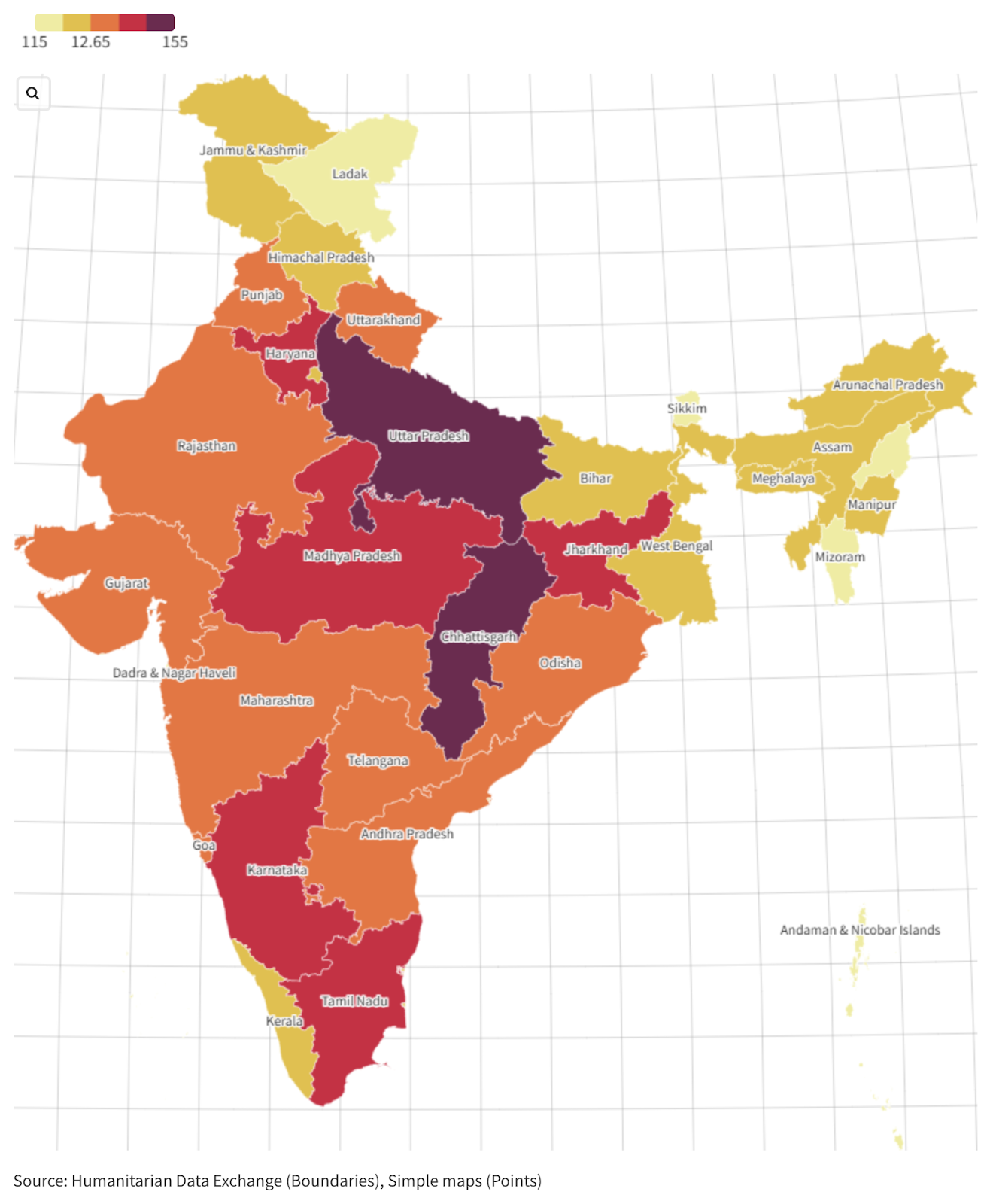
Adivasis and Dalits together make up about 25% of India’s population—8.9% Adivasis and 16.6% Dalits. Of the total 2.78 crore Christians, 37.5% belonged to scheduled tribes, as per the 2011 census.
Between 2001 and 2011, the number of tribals identifying as Hindus grew from 6.04 crore to 8.41 crore, a 39% increase, even as tribals identifying as animists, outside the three dominant faiths, declined from 1.64 crore in 2001 to 0.78 crore in 2011. (Meanwhile, tribals who identify as Christians grew by 63%, from 63.90 lakh in 2001 to 1.03 crore in 2011.)
While Dalits fear losing scheduled caste status if they convert, forcing them to identify as Hindus, Hindutva insists on viewing Adivasis as Hindus despite their distinct forms of worship rooted in nature and land. Citizens from these communities who adopt other faiths are seen as targets for “reconversion” to Hinduism.
No Conversion Except To ‘Ancestral Religion’
Meanwhile, 12 states have ‘anti-conversion’ laws prohibiting ‘unlawful conversion’, ostensibly to prevent ‘forced conversions’, but ultimately targeting minorities and empowering vigilantes, as Article 14 has reported here, here, & here.
Of these 12 states, BJP-led governments enacted, replaced or amended existing laws with stricter provisions in 10 states. In at least six states, these statutes, prescribing stricter punishment (such as here, here, & here) for conversion of persons from scheduled caste or scheduled tribe communities, however exempt the “re-conversion” to “ancestral” or “original” religions.
According to UCF’s data, 75% of the anti-Christian incidents in 2014-24 occurred in states with anti-conversion laws, most ruled by the BJP.
“The right wing is propagating the ‘ghar wapsi’ (homecoming) campaign in rural India, where the scheduled tribes and castes make up the majority of the Christians,” Michael Williams, president of UCF, told Article 14.
It was a seat-sharing dispute and the 2007-08 anti-Christian violence in Kandhamal instigated by Vishwa Hindu Parishad (VHP) leader Laxmanananda Saraswati, and subsequent violent episodes following his murder, that caused the BJD-BJP coalition fall apart in 2009.
“In Kandhamal, Saraswati, the face of the anti-Christian campaign, ran gurukuls, ashrams and welfare services doubling as ideological outreach,” said Manoranjan Mohanty, human rights activist, distinguished professor at the Council for Social Development, and director of the Development Research Institute in Bhubaneshwar. This consolidation of tribals into the Hindu fold extended across Odisha, reflecting what Mohanty calls a larger “Hinduisation” in the central-eastern tribal states.
“The BJD courted Adivasi support for electoral calculations,” said Mohanty. “Its former ally deepened its Hindutva agenda to fragment them.”
Oraon, the BJP Rajya Sabha MP, argued that the attacks were against those violating laws against religious conversion. “The villagers see such groups as harming them, their culture and traditions, and they resist it,” he said. “If you are harming them and they retaliate, can it be said that the BJP is making it happen?”
Priests, Women, Children Attacked
Article 14 documented eight incidents of intimidation against Odisha’s tribal Christians between October 2024 and August 2025. In five cases, families were prevented from burying their dead, and three were violent attacks.
In two cases, families of the deceased were forced to ‘convert’ to Hinduism before they were permitted to bury a family member in the village. They were barred from using a common graveyard in the absence of a designated site to bury Christians, and were also obstructed from using private land for burial. In one of these cases, the body was exhumed a few hours after it was buried in agricultural land.
In a third case, the deceased was buried in a distant forest. In yet another, the corpse was ‘converted’ to Hinduism before Hindu villagers permitted a burial. In a fifth case, police summoned a Christian priest after villagers objected to a burial.
These incidents occurred despite the Fifth Schedule of the Constitution and laws such as the Panchayat (Extension to Scheduled Areas) Act (PESA), 1996, extending protection to customary tribal traditions and land in scheduled areas.
The Fifth Schedule mandates tribal control and administration of the “scheduled areas” notified by the president, while PESA gives special powers to the gram sabhas (village general body) in scheduled areas to manage land and resources, irrespective of the people’s faith.
Of the three violent attacks, the first occurred in March 2025 in the south-eastern Gajapati district. Priest Joshy George, one of the victims, described it as an “unprovoked police assault” in which he, a fellow priest, two tribal women and two minor girls were beaten.
On 21 June 2025, more than 30 tribal Christians were attacked in Malkangiri district in the south-west.
In August, over 70 men, allegedly linked to the Bajrang Dal, assaulted a Christian villager and two priests who visited a village in Jaleswar in Balasore district for a requiem mass (prayers for the departed).
Body Exhumed, Burnt In A Forest
On 16 April 2025, Hindu residents led by Mayaram Gond, a local villager later named in the first information report (FIR) relating to the incident, obstructed the burial of 21-year-old Saravan Gond in Malbeda village, Nabarangpur. Saravan Gond had died the previous day in a borewell accident in Maharashtra.
Ganshyam Gond, Saravan Gond’s uncle, said villagers insisted that a burial would be allowed only in a Christian-majority village. To bury him in Malbeda, the family would have to convert to Hinduism.
“We refused, asserting our dignity and land rights,” said Ramchandra Gond, Saravan Gond's father. The body was buried in the family's agricultural land on 17 April, an act they said infuriated villagers.
On 28 April, Ramchandra Gond filed a complaint at the Raighar police station after his and Ghanshyam Gond’s families were ostracised by villagers. The FIR stated that on 17 April, villagers assaulted Ramchandra Gond’s wife and 16-year-old daughter Sabita, tore their clothes, and attacked three other relatives.
Villagers reportedly demanded that the body be exhumed, and also threatened to kill Ramchandra Gond. They warned his family to leave the village unless they “re-converted” to Hinduism.
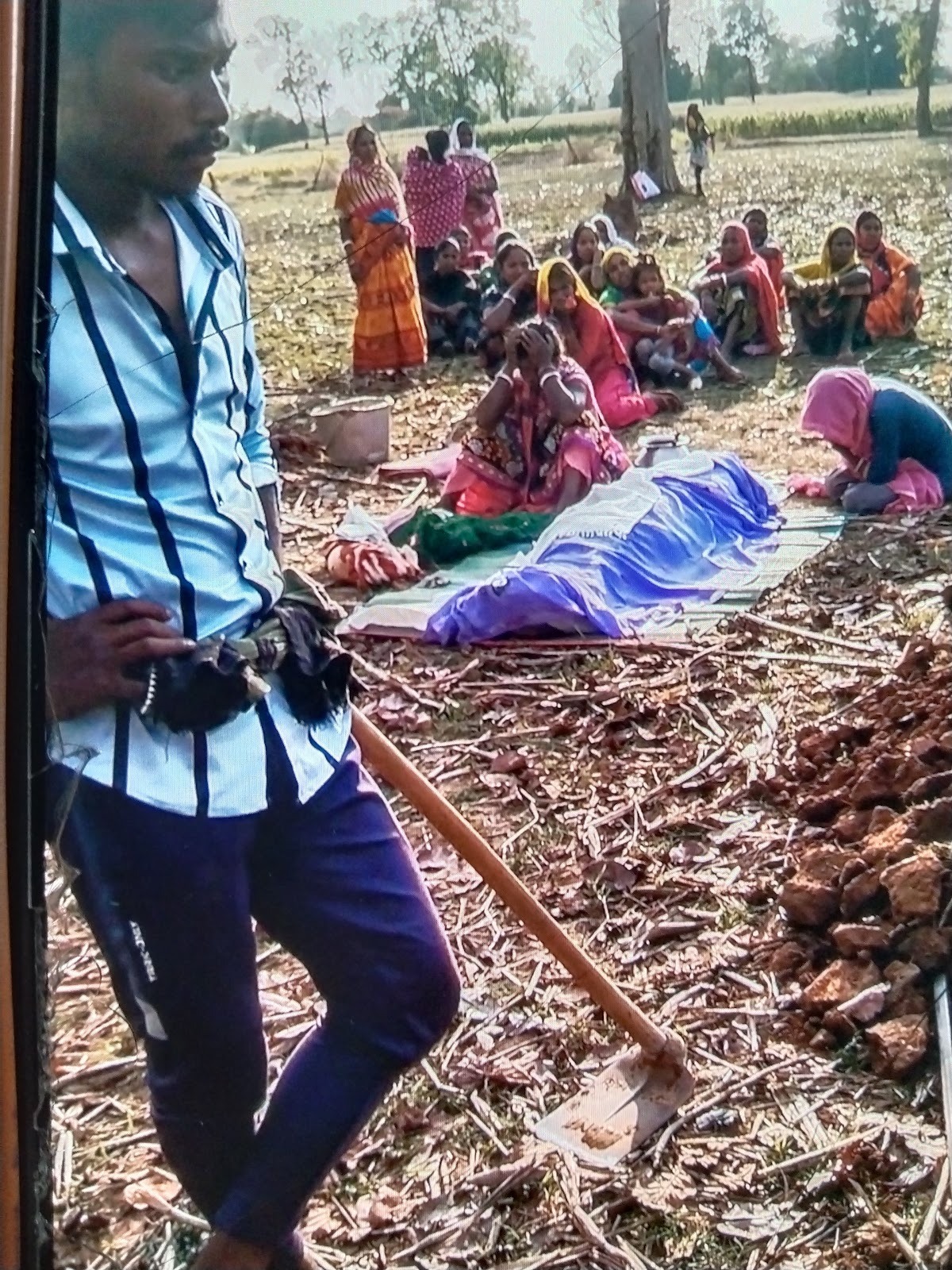
“The villagers waited until the police left, then exhumed the body, and burnt it in the forest,” Ramchandra Gond told Article 14.
The FIR invoked sections 191(2) (rioting), 191(3) (rioting with weapons), 74 (assault or criminal force to woman with intent to outrage her modesty), 115(2) (voluntarily causing hurt), 351(2) (criminal intimidation), and 190 (offence by an unlawful assembly) of the Bharatiya Nyaya Sanhita (BNS), 2023, with 10 named accused and others unnamed.
No action was taken on the FIR, the family said on 21 October.
In April 2025, however, they fled the village, abandoning their maize and paddy crop that stood ready to be harvested.
Bereaved, Accused Of Breach Of Peace
Keshav Santa, a 60-year-old tribal who died on 2 March 2025 in Siunaguda village of Nabarangpur, met a similar fate. Though he did not practise Christianity, villagers refused to permit his body to be buried in the village because his son is a practising Christian.
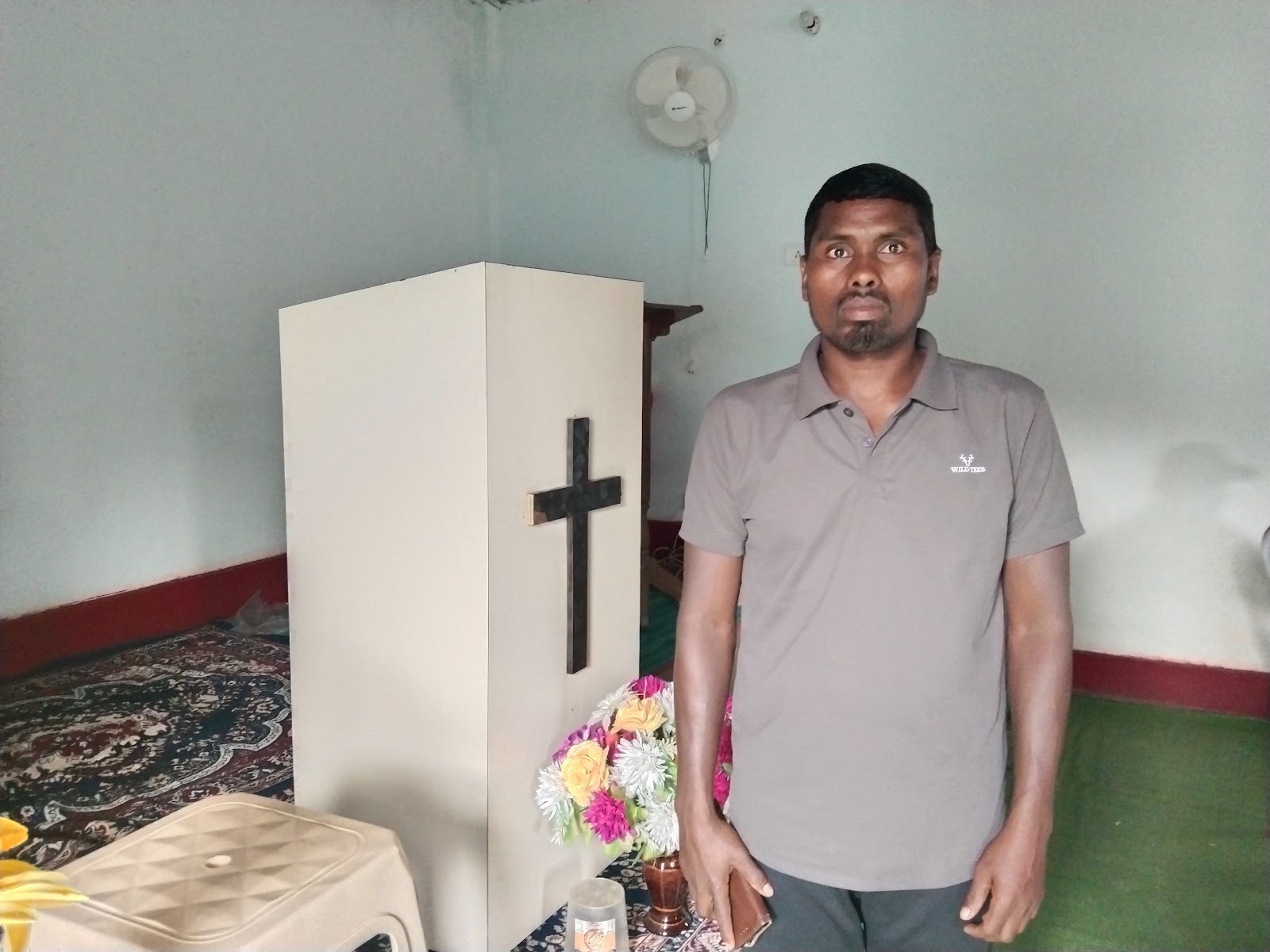
Keshav Santa’s son Tirpu Santa was confronted by Hindu villagers soon after he lost his father, the family said. “They asked us to convert or take the body out of the village for burial,” said Gangadhar Santa, Keshav Santa’s grandson.
The next day, on 3 March, the police and the Umerkote tehsildar arrived in the village, following Gangadhar Santa's complaint that he was being obstructed from burying his father in the family's private agricultural land.
“They took no action because of pressure from Hindu villagers, led by Purnachandra Bagh, who threatened us in front of the officials that the burial would not be allowed unless we converted to Hinduism,” Gangadhar Santa said.
In response to the allegation, Bagh told Article 14 that Gangadhar Santa, the only Christian in the village, fought with the villagers over his insistence on burying the body in the village. “There is no designated site (for Christians),” Bagh said.
According to Gangadhar Santa, Tirpu Santa was forced to declare that he was leaving the Christian faith and becoming Hindu. A week later, on 9 March, Keshav Santa’s body was finally buried.
On 29 March, Gangadhar Santa complained to the police that his family, one of two remaining Christian households in the village, was being denied access to water, their electricity connection had been curtailed, and that they were being harassed.
“I was instead accused of disturbing the peace,” he said.
On 25 April, the Umerkote tehsildar issued a show-cause notice summoning the village’s Christians—Gangadhar, his wife, mother, maternal uncle and aunt—as being “likely to commit a breach of the peace” and asking why they should not be required to furnish a Rs 10,000-bond with a surety.
Maghaban Bagh, tehsildar of Umerkote, told Article 14 that the notice was issued in order to resolve the dispute. “The matter was forwarded to me under section 107 (security for keeping peace) of the CrPC, by the police. That’s why I bound them to ensure there would be no further disputes—to resolve the issue,” he said.
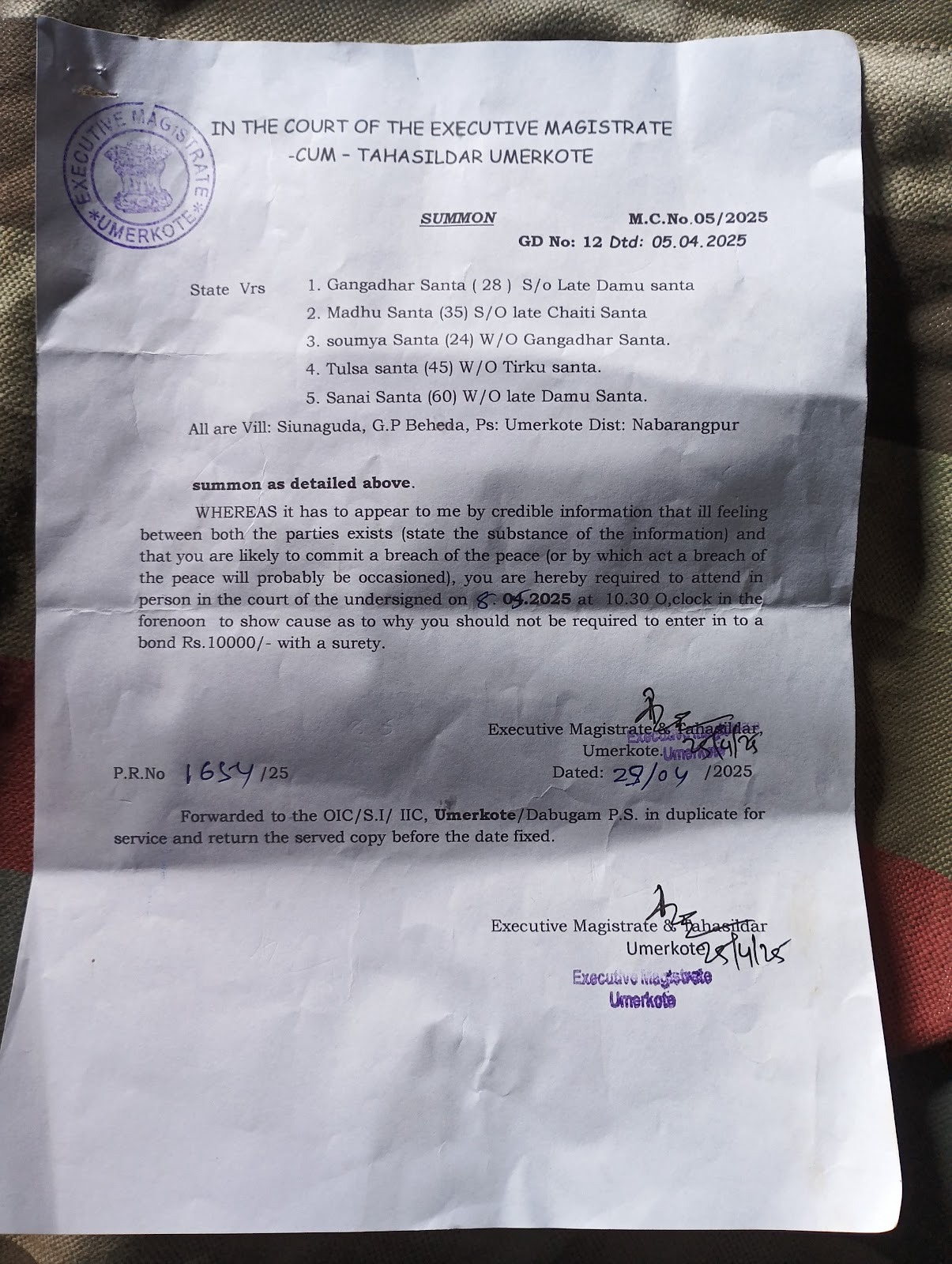
No Dignified Burial, No Legal Recourse
In Pondikote village, Nabarangpur, the body of 60-year-old Domu Jani, a Paraja Adivasi and Christian who died on 28 October 2024, was not interred for two days as Hindus barred the family’s attempt to bury the body in the common graveyard or on their own land.
“Because Domu had converted to Christianity, he could not be buried in our village which has a Hindu majority,” said Babula Bhatra, sarpanch of Pondikote since 2022.
“They set a precondition that I must convert to Hinduism,” said Shanti Jani, Domu Jani’s wife, who refused to renounce Christianity.
Shanti Jani was eventually forced to bury her husband 3 km away in a forest, after the local administration arranged an alternative site, having failed to convince the locals.
“I got the revenue inspector to arrange a site away from the village because Domu was Christian,” Bhatra said.
In Balasore, the death of Budai Murmu, a Santhal Adivasi Christian, on 18 December 2024 sparked a similar conflict over burial rights. Murmu was buried after 12 hours of confrontation between Christians and members of the village’s Majhi Pargana, the Santhal system of local governance.
Article 14 attempted to contact local leader Budhiram Majhi via phone calls on 31 August and 5 September, but received no response.
Binod Hansda, a member of the Jaleswar parish to which Murmu belonged, said the dispute arose after police summoned Biswajit Parikh, a pastor who performed the last rites, based on the Majhi Pargana members’ complaints.
On 24 February 2025, over two months after Murmu died, a meeting was held between both parties to discuss objections raised by the Majhi Pargana over the burial issue. Hansda said it was to resolve the dispute over Christian Adivasis’ right to bury their dead, but the Majhi Pargana claimed the Constitution offered no such guarantee, and the issue remained unresolved.
Article 14 attempted to contact Satyajit Mohanty, tehsildar of Jaleswar, via phone calls and WhatsApp messages but received no response.
More Violent Attacks
When Sukra Madi, an Adivasi Christian priest, lowered his head, the scar running across his skull told the story of an axe blow he survived.
He was one of 30 tribal Christians beaten by a mob of nearly 300 men affiliated to Hindutva outfits, in Kotamateru village of Malkangiri district, on 21 June 2025, as they returned from a ceremony marking the start of the harvest season.
“The attack was punishment for resisting forceful conversion to Hinduism," said 52-year-old Madi. “I almost died.”
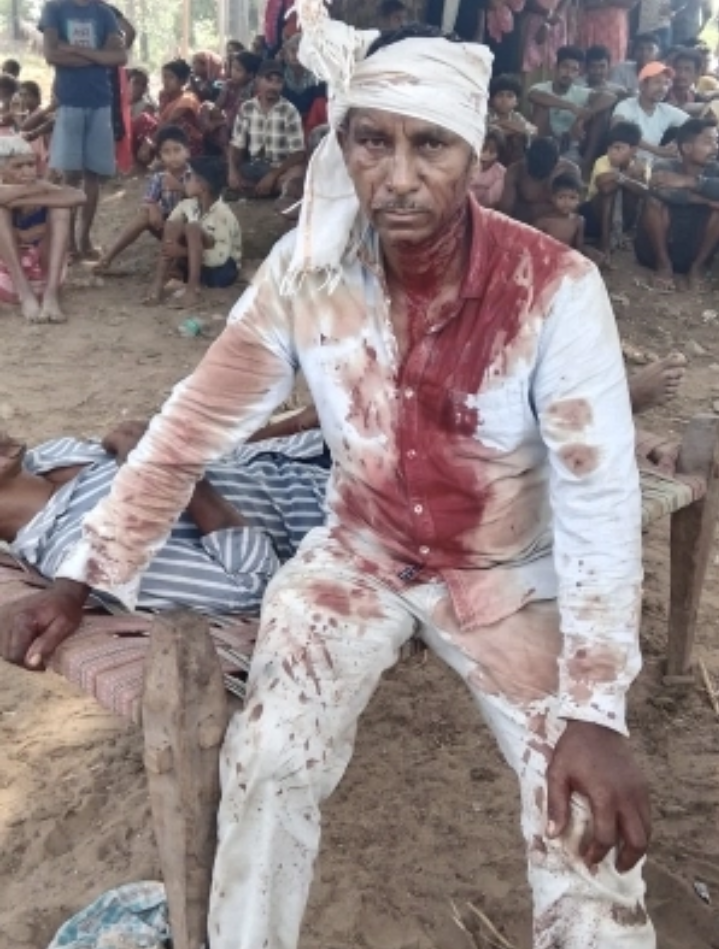
The following day, Laxman Kumar Beti, one of the victims of the assault, filed a complaint at the Malkangiri police station.
“The men leading the mob said we had no permission to gather for prayers. They objected to Christians coming from other villages,” Beti told Article 14. “They accused us of carrying out conversions and then began to assault us.”
The FIR based on Beti’s complaint invoked sections 127 (wrongful confinement), 115(2) (voluntarily causing hurt), 117(2) (voluntarily causing grievous hurt), 118(1) (voluntarily causing hurt or grievous hurt by dangerous weapons or means), 351(3) (criminal intimidation), and 3(5) (criminal act with common intent) of the BNS against 16 men. It said they “pre-planned, organised, and came to the spot with weapons” to execute the violent attack.
“The violence was linked to the Sanskriti Bachao Abhiyan, a campaign by right-wing Hindutva groups to pressure tribals into converting to Hinduism,” Lima said.
As the mob swelled, Samruque Musaki, one of the priests who conducted the harvest ceremony, called the police, for which he was allegedly identified and beaten by the mob.
“They beat whoever they caught with sticks, knives, spades, axes, even kicking them while they lay on the ground,” Bima Madkami, a 40-year-old victim of the attack said.
“Many of the victims couldn't return to the village fearing they would be attacked again,” Prabhakar Suna, vice-president of the Malkangiri District Christian Morcha, said.
Musaki said that they sought an assurance from the police that villagers would not obstruct their prayers later, but on 6 July, they were allegedly “pressured” into a compromise during a meeting with the police. The Christian Adivasis spoke only Gondi while the police spoke Odia, Musaki said.
Rigan Kindo, police inspector of the Malkangiri police station, told Article 14 that the dispute arose from differences between Christian and traditional tribal rituals, which involve prayers before harvest and during sowing. He said a meeting was convened to resolve the tensions over Christian villagers offering prayers in Kotamateru village.
“No one was forced to sign,” he said. “They understand both Odia and Gondi, and they are living together peacefully now.”
Desecration By Policemen
On 22 March 2025, the Our Lady of Lourdes church in Juba village of Gajapati district, was being prepared for Sunday prayers when around 15 police personnel allegedly entered and desecrated it, breaking a statue of Mother Mary and using batons to damage other property.
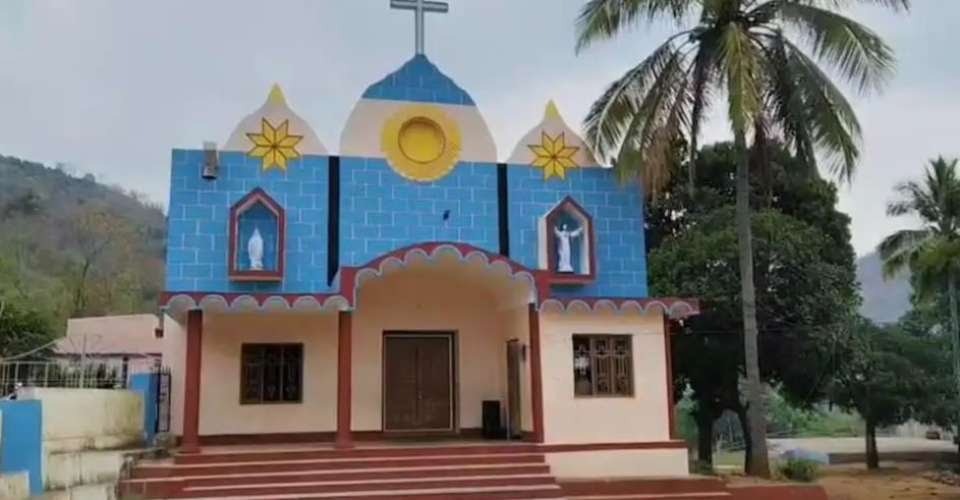
The police action followed raids in Pidika, a neighbouring village where police found illegal marijuana cultivation.
Gajapati’s superintendent of police, Jatin Panda, told reporters on 22 March that villagers had blocked the police team’s access into Juba. “When police tried to remove the trees they had laid across the road, the villagers clashed (with police), injuring 26 personnel and targeting six vehicles,” he said.
Joshy George, 57, the head priest of the church, said two young Kondh Adivasi women, aged 20 and 18, were beaten and dragged into a police bus, prompting two minor girls, both 12, to rush into the presbytery, the priest’s house.
George and assistant priest Dayanand Nayak were then allegedly beaten by police, on allegations of conducting conversions. Nayak suffered a fractured shoulder blade.
Father E A Thomas, a lawyer and Catholic priest in Brahmapur district, who was part of a legal team that visited the church, said that police desecrated the statues of Jesus and Mary, destroyed food supplies and villagers’ belongings.
“Such actions single out Christians and targeted Adivasis, amounting to both religious persecution and atrocities against scheduled tribes,” Thomas said.
On 8 April, George submitted a complaint at Mohana police station, but did not receive a written acknowledgement.
In another incident on 26 December 2024, two tribal sisters, Subhasini Singh and Sukanti Singh, were tied to a tree in a Balasore village and beaten by members of Hindutva outfits who accused them of attempting to convert a Hindu man to Christianity.
On 6 August 2025, Father Lijo George of Saint Thomas Church in Jaleswar, priest Jojo Vaidyakaran and two nuns were attacked while returning from Gangadharpur, where they had conducted a mass. A mob of nearly 70 people was allegedly led by a BJP leader, they said.
Lijo George told Article 14 that the assailants shouted while they beat him, searched the car, and threw out copies of the Bible and other prayer material. “This is BJP rule in Odisha now, not BJD rule, they screamed,” he said.
George said the attack continued until police arrived and escorted them to safety. They did not file a complaint, fearing further retaliation.
“They’ll bring false allegations,” he said, “and worsen our people's misery.”
(Syed Affan is a Delhi-based journalist who reports on human rights, the environment, and policy.)
Get exclusive access to new databases, expert analyses, weekly newsletters, book excerpts and new ideas on democracy, law and society in India. Subscribe to Article 14.

